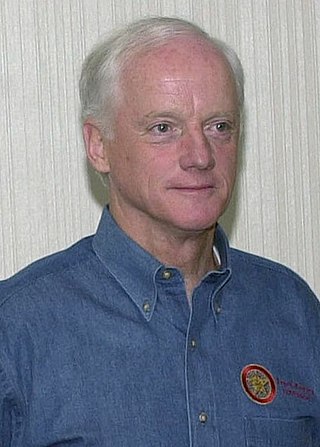Related Research Articles

Francis Anthony Keating II is an American attorney and politician who served as the 25th governor of Oklahoma from 1995 to 2003.
Vincent L. Leibell III is a former American politician from Putnam County, New York. After a long career in the New York State Legislature, Leibell ran for and was elected county executive in 2010, but resigned prior to taking office following an investigation by the Federal Bureau of Investigation which led to his arrest and subsequent conviction on federal corruption charges.

Corruption in the government of Kenya has a history which spans the era of the founding president Jomo Kenyatta, to Daniel arap Moi's KANU, Mwai Kibaki's PNU governments. President Uhuru Kenyatta's Jubilee Party government, and the current William Ruto's Kenya Kwanza administration has also been riddled with massive cases of graft.
The South Carolina Department of Transportation (SCDOT) is a government agency in the US state of South Carolina. Its mission is to build and maintain roads and bridges and administer mass transit services.

James Clark "Jim" Nance was a leader for 40 years in the Oklahoma Legislature in the U.S. state of Oklahoma and was community newspaper chain publisher 66 years. Nance served as Speaker of the Oklahoma House of Representatives and President pro tempore of the Oklahoma Senate. During his legislative career, Nance wrote the "Honest Mistake" law which became a model for other states. Nance then became a key sponsor and Legislative Chairman of the U.S. Uniform Law Commission (ULC), sponsored by the National Conference of Commissioners on Uniform State Laws, a non-partisan advisory panel which drafted uniform acts and uniform state commerce laws. Nance became known as a legislative expert in a 40-year legislative career as one of two Oklahomans to hold the top posts in both chambers of the Oklahoma Legislature. The state's largest newspaper, The Daily Oklahoman wrote he was the "longest serving Oklahoma Legislator" and "A Legislator's Legislator." Nance, a Democrat, is the only Oklahoma House Speaker elected through a bipartisan coalition of Democrats and Republicans. Fiercely Independent, Nance considered public policy work to be a service and did not ever accept a salary or pension for any of his 40 years in the legislature and 24 years on the Uniform Law Commission. Nance refused to work as a lobbyist, although he had many offers after leaving office.

Corruption in South Africa includes the improper use of public resources for private ends, including bribery and improper favouritism. Corruption was at its highest during the period of state capture under the presidency of Jacob Zuma and has remained widespread, negatively "affecting criminal justice, service provision, economic opportunity, social cohesion and political integrity" of South Africa.

Corruption in the United States is the act of government officials abusing their political powers for private gain, typically through bribery or other methods, in the United States government. Corruption in the United States has been a perennial political issue, peaking in the Jacksonian era and the Gilded Age before declining with the reforms of the Progressive Era.
Thomas E. Daxon was an American businessman and politician from Oklahoma. Daxon had held numerous positions with the Oklahoma state government, including being elected Oklahoma State Auditor and Inspector in 1978 and serving as the Oklahoma Secretary of Finance and Revenue under Governor of Oklahoma Frank Keating. He was the Republican nominee for governor in the 1982 election, ultimately losing to Democratic incumbent George Nigh.
Randy Terrill is an American politician. A Republican, he is a former member of the Oklahoma House of Representatives from Moore, Oklahoma.

Giuseppe Orsi is an Italian engineer, businessman, and corporate executive. He had a long career at Finmeccanica, Italy's leading high-technology group, and in November 2011 was appointed its Chief Executive Officer and Chairman.

Corruption in Italy is a major problem. In Transparency International's annual surveys, Italy has consistently been regarded as one of the most corrupt countries in the Eurozone. Political corruption remains a major problem particularly in Lombardy, Campania and Sicily where corruption perception is at a high level. Political parties are ranked the most corrupt institution in Italy, closely followed by public officials and Parliament, according to Transparency International. But in the 2013 Global Corruption Barometer report, Italy is in 17th position in front of the United Kingdom (18th), Switzerland (21st) and the United States (22nd).

Corruption in Thailand is a national issue. Thai law provides criminal penalties for conviction of official corruption. Thailand's 2014 military junta, the National Council for Peace and Order (NCPO), stated that fighting corruption would be one of its main focus points, a common practice for military dictatorships following Thailand's frequent military coups. Despite the promises, officials engaged in corrupt practices with impunity, and the NCPO engaged in corrupt practices itself.
Bruno Spagnolini is an Italian engineer and businessman who served as CEO of AgustaWestland, the helicopter-manufacturing division of Finmeccanica. After being charged in 2013 with participation in a bribery scandal, he resigned from the position as CEO. On October 9, 2014, an Italian court sentenced him to two years in prison for false bookkeeping. As of November 2014, an investigation in India was still underway.
Lorenzo Borgogni is an Italian businessman who was the longtime director of external relations at Finmeccanica, a partly government-owned company specialising in aerospace, defense and security.
Christopher B. Epps is a Federal inmate and a former commissioner of the Mississippi Department of Corrections (MDOC) and career employee in the state criminal justice system though he started his career as a teacher. Appointed as Commissioner in 2002 and serving until 2014, he served under three governors and was the agency's longest-serving commissioner in its history. Epps came up within the department as a 32-year career employee.

Operation Car Wash was a landmark anti-corruption probe in Brazil. Beginning in March 2014 as the investigation of a small car wash in Brasília over money laundering, the proceedings uncovered a massive corruption scheme in the Brazilian federal government, particularly in state-owned enterprises. The probe was conducted through a joint task force of agents in the federal police, revenue collection agency, internal audit office and antitrust regulator. Evidence was collected and presented to the court system by a team of federal prosecutors led by Deltan Dallagnol, while the judge in charge of the operation was Sergio Moro. Eventually, other federal prosecutors and judges would go on to oversee related cases under their jurisdictions in various Brazilian states. The operation implicated leading businessmen, federal congressmen, senators, state governors, federal government ministers, and former presidents Collor, Temer and Lula. Companies and individual accused of involvement have agreed to pay 25 billion reais in fines and restitution of embezzled public funds.

Corruption in Bolivia is a major problem that has been called an accepted part of life in the country. It can be found at all levels of Bolivian society. Citizens of the country perceive the judiciary, police and public administration generally as the country's most corrupt. Corruption is also widespread among officials who are supposed to control the illegal drug trade and among those working in and with extractive industries.
Operation Mississippi Hustle was a federal investigation initiated in 2014 by the United States Attorney and prosecuted in the United States District Court for the Southern District of Mississippi. It examined the relationship between officials of the Mississippi Department of Corrections and various for-profit prison contractors and subcontractors, who have provided services to the five private prisons in the state. One, Walnut Grove, closed in September 2016 but has since reopened.
Cecil McCrory is a former Mississippi state legislator, justice court judge, Rankin County school board president and businessman. His indictment was made public in November 2014 for corruption related to his dealings with prison industry contractors. It was later revealed that he had become an informant in the investigation, along with his partner in crime, ex-Commissioner of Corrections in Mississippi, Chris Epps. Epps was sentenced to 235 months and McCrory to 102 months in federal prison. Both men were fined and ordered to pay restitution. McCrory is being held at the Federal Correctional Institution, Talladega, Alabama, with a scheduled release date of April 24, 2025.
The GSK China scandal was a scandal where the China branch of the global drugmaker GlaxoSmithKline (GSK) pleaded guilty to paying bribes to doctors and hospitals to promote the company's products in China.
References
- 1 2 3 4 5 "Toll 230 as book closes on county commissioner scandal". The Oklahoman . 3 February 1984.
- ↑ Holloway, Harry. "Scandals, Political". The Encyclopedia of Oklahoma History and Culture. Oklahoma Historical Society. Retrieved 2023-10-10.
- 1 2 3 4 5 6 7 8 9 10 11 12 13 14 15 16 Holloway, Harry; Meyers, Frank S. (October 1992). "The Oklahoma County Commissioner Scandal: Review, Rerform, and the County Lobby". Oklahoma Politics. 1: 17–34.
- 1 2 3 4 5 6 7 Jones, Charles T. (13 February 1983). "Once Hit, Commissioners "Tumbled Like Dominoes'". The Oklahoman .
- 1 2 3 Pearson, Janet (1989-12-31). "Oklahomans Wrote History in '80s". Tulsa World. Retrieved 2023-10-10.